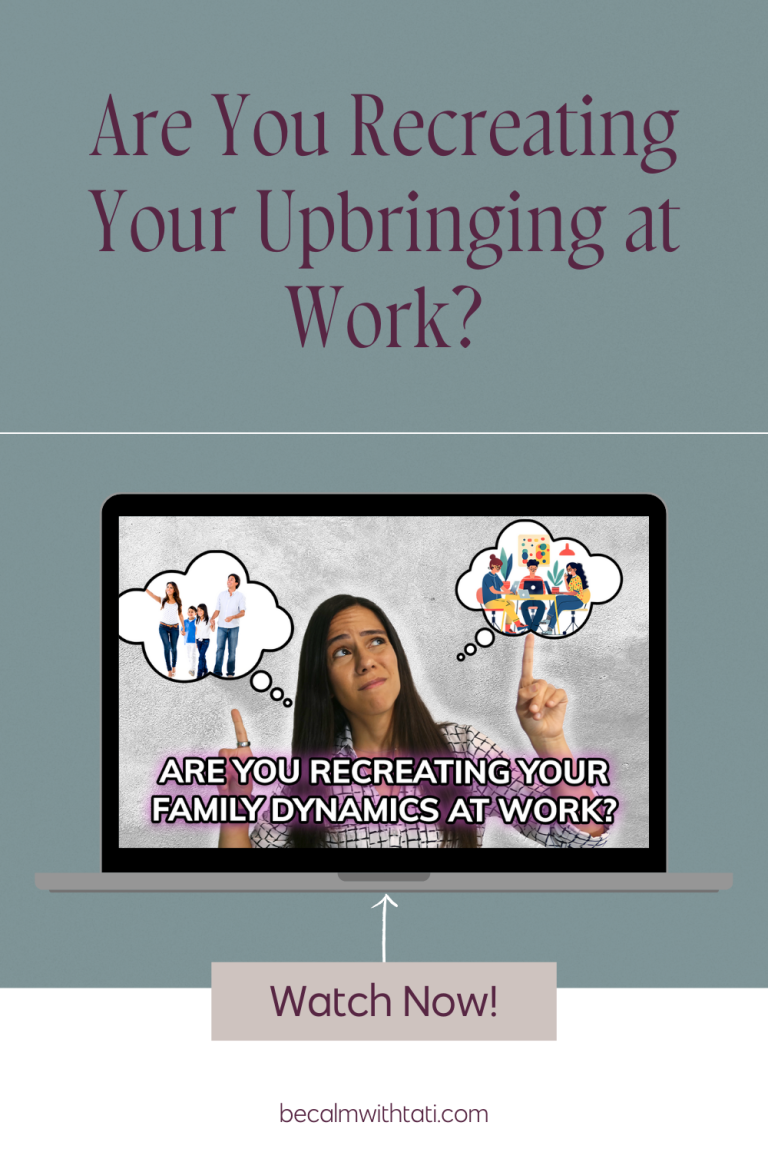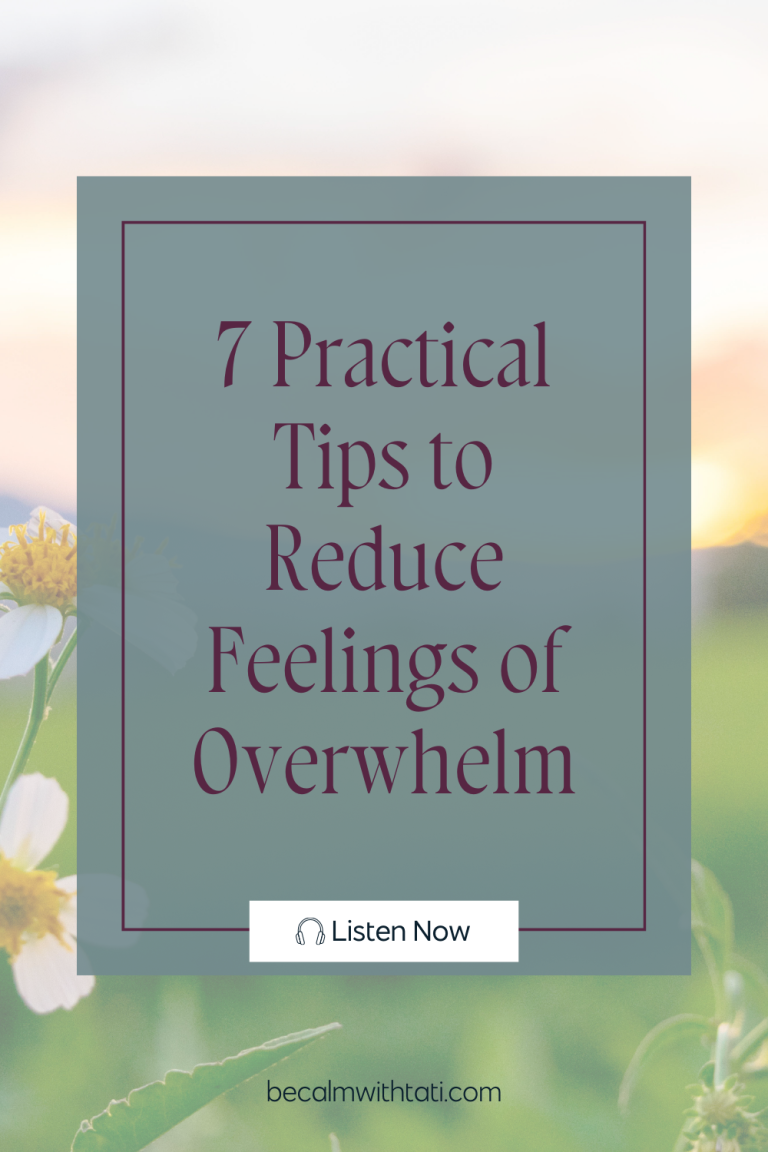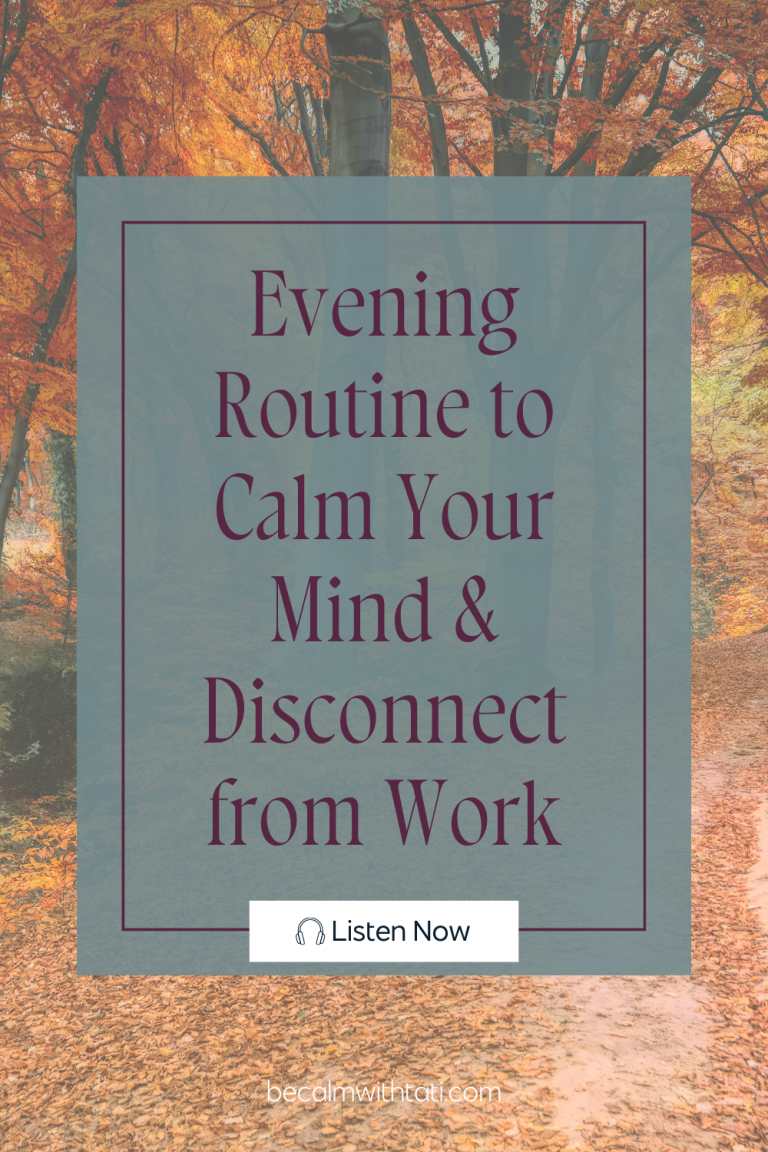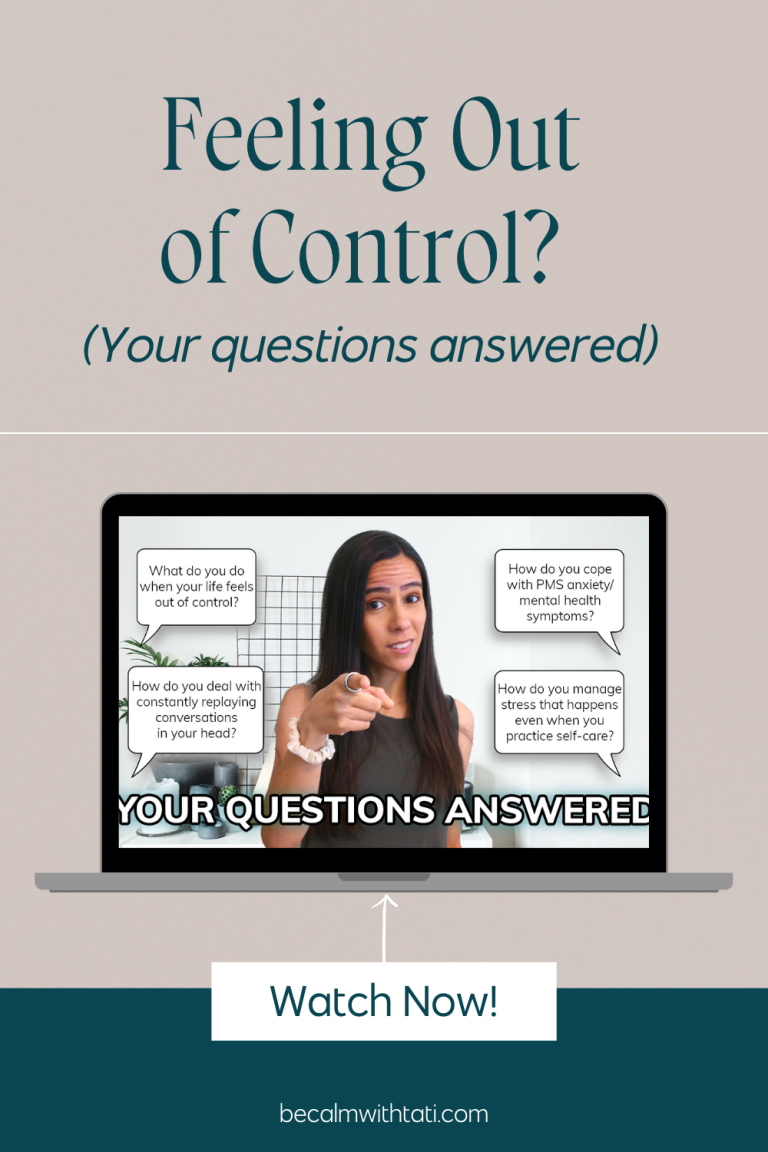Getting things done. Many of us have learned to use discipline and tough love to get things done, despite the waning motivation we might experience. However, in recent years, research on self-compassion has demonstrated the benefits of being kind and understanding with yourself and how that can have a positive impact on your mental health, self-esteem, motivation, resiliency, and more. But is self-compassion counter to discipline? Will you ever get things done if you are too kind and understanding with yourself? In this episode, I’ll dive into the differences between discipline and self-compassion and how to have a balance so you can get things done while supporting yourself.
In this episode, you will learn:
- The difference between self-compassion and discipline
- The surprising thing you NEED to know to avoid perfectionism, burnout, and anxiety when practicing discipline
- 7 practical tips to balance self-compassion with self-discipline
LISTEN NOW:
🎧 CLICK HERE TO LISTEN TO CALMLY COPING WHEREVER YOU LISTEN TO PODCASTS
WATCH NOW:
Source:
https://self-compassion.org/what-is-self-compassion/#research-on-self-compassion
🎓 Learn more about The Calm & Ambitious Membership: Calm and Ambitious
💬 Submit a message, question, or suggestion to the podcast: Message
FREE TRAINING: Achieve A Calm Mind, Balanced Life, & Empowered Confidence in 90 Days
If you want to learn how to take back control of your life so you can feel calmer and more confident, and learn the tools to spend your time according to what matters most to you (no matter what your schedule is like right now)…
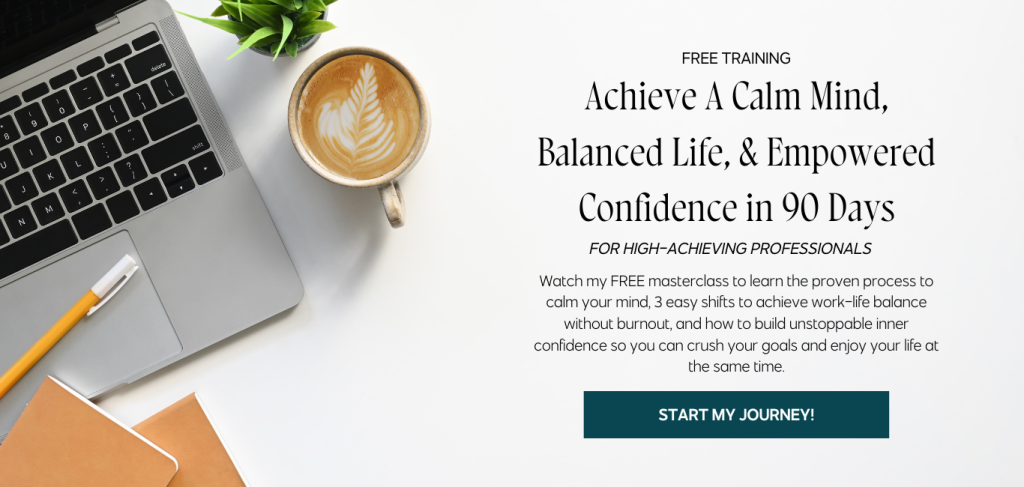
LISTEN, REVIEW, AND SUBSCRIBE TO THE PODCAST!
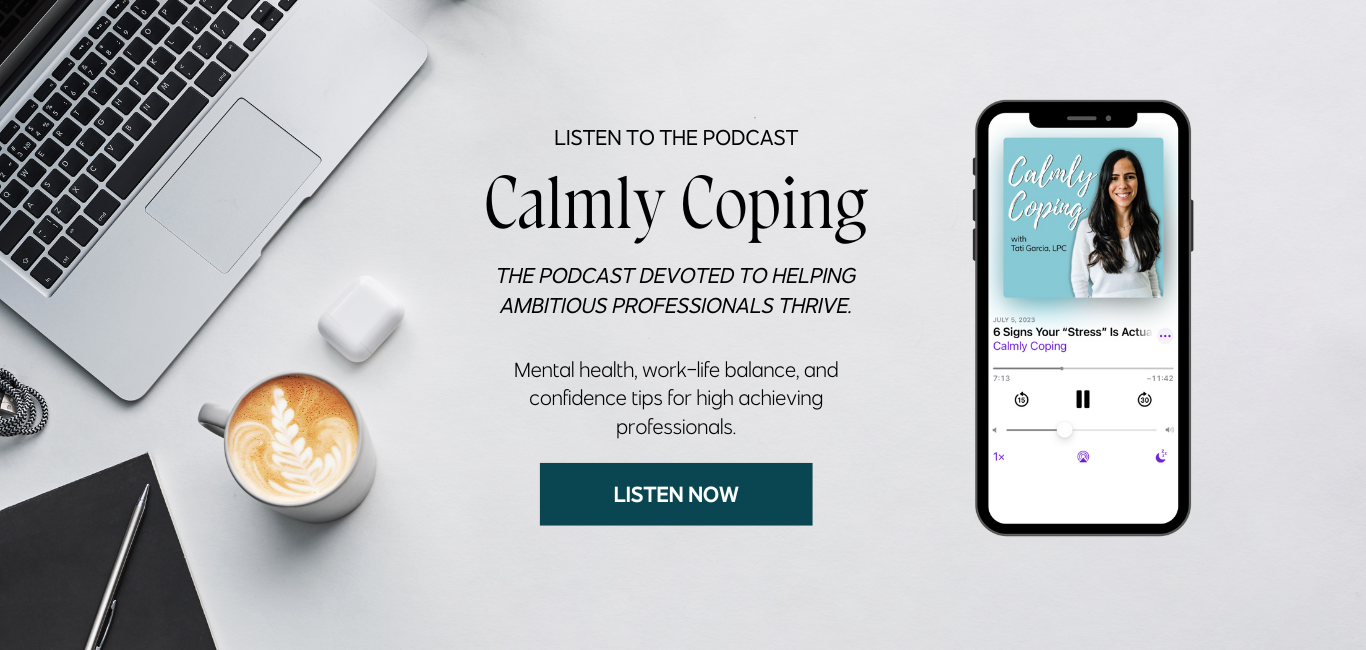
INTRO/OUTRO MUSIC: Rescue Me (Instrumental) by Aussens@iter (c) copyright 2018 Licensed under a Creative Commons Attribution (3.0) license. http://dig.ccmixter.org/files/tobias_weber/57990 Ft: Copperhead
DISCLAIMER: All content here is for informational purposes only. This content does not replace the professional judgment of your own mental health provider. Please consult a licensed mental health professional for all individual questions and issues.
Interested in diving deeper to get support for high-functioning anxiety?
I offer 1:1 coaching to help high-achievers overcoming high-functioning anxiety so they can feel calmer, more present, and have improved balance in their lives. Click here if you’re interested in learning more and getting started.
Calm, Balanced, & Confident is my comprehensive A→Z self-paced course to help high-achieving professionals overcome high-functioning anxiety so they can feel calmer, balanced, and more confident without the anxiety and overwhelm. Click here to learn more and enroll today.
Looking for ongoing support and guidance with high-functioning anxiety? The Calm & Ambitious Community is the exclusive community for high achievers with high-functioning anxiety. Click here to learn more and join us today!
TRANSCRIPT:
Click to view the episode transcript.
Many of us have learned to use discipline and tough love to get things done, despite the waning motivation we might experience. However, in recent years, research on self compassion has demonstrated the benefits of being kind and understanding with yourself, and how that can have a positive impact on your mental health, resiliency, self esteem, and more.
But is self compassion counter to discipline? Will you ever get things done if you’re being too kind and understanding with yourself? In this episode, I’ll dive into the difference between self compassion and discipline and how to have a balance so you can get things done while supporting yourself.
Welcome to Calmly Coping. I’m your host, Tati Garcia. I’m a licensed therapist and a high functioning anxiety coach. Calmly Coping is the podcast for people who struggle with anxiety and high functioning anxiety. Each Wednesday, you’ll hear informative episodes with actionable tips about decreasing anxiety, adopting a healthy mindset, and managing your time and energy so you can live a calm and balanced life.
Let’s get started.
Thank you so much for tuning in. So the common approach to getting things done is using this discipline to motivate ourselves. However, it can sometimes be challenging to maintain motivation. And discipline can be used to help to push us through. Alright, I don’t feel like doing this thing now, but I’m going to use discipline to help me to stick to the things that I want for myself.
So what is discipline? And in this sense, of course, I’m talking about self discipline. The dictionary defines it as, quote, the ability to control one’s mind. feelings and overcome one’s weaknesses. The ability to pursue what one thinks is right, despite temptations to abandon it. Discipline has historically been viewed as a key driver for getting things done.
Angela Duckworth’s research on Grit, which is an excellent book that I recommend if you haven’t read it yet, emphasizes that Perseverance and passion for long term goals, which are both aspects of discipline, are better predictors of academic success than IQ. And this is something that is also reinforced in the book Mindset by Carol Dweck.
And this indicates that Disciplined students are more likely to achieve their educational objectives than just those who have this innate intelligence to know certain things. So it’s about the discipline, the effort to continue putting in more work towards the things that are important to you. That results in outcomes and results in you achieving the things that are important to you or that you need to in life.
However, there can sometimes be downsides to relying solely on discipline, such as burnout, perfectionism, and stress, especially if you’re somebody who’s high achieving. So when it comes to burnout, maybe you’re continuing to push forward because discipline tells you that you need to keep doing more and more, but you’re finding that this is maybe counter to your need and desire for rest and self care.
Same thing with perfectionism. So maybe if you’re somebody who is a perfectionist, you feel like You need to do things perfectly. You need to work out five days a week in perpetuity. And if you miss one day, then that means that you’ve failed. And so if you’re coming from this perspective of discipline, then it can feel really discouraging when things don’t go according to plan or you don’t follow the specifications that you had initially set out for yourself.
And this can lead to anxiety as well as depression because of the focus on black and white thinking. Seeing things on all or nothing terms, where it’s either you have done things perfectly and you have succeeded or you missed one thing and now it is nothing and you have failed. And this leaves little room for self compassion.
On the other hand, let’s talk about self compassion. So here’s a quote about self compassion that I got from selfcompassion. org by Kristen Neff, who is a researcher in self compassion. So it’s quote, instead of mercilessly judging and criticizing yourself for various inadequacies or shortcomings, self compassion means you are kind and understanding when confronted with your failings.
After all, whoever said you were supposed to be perfect? Unquote. Numerous studies confirm that self compassion is associated with better mental health outcomes, including reduced anxiety, depression, and stress. It’s the act of being kind and supportive to yourself and being understanding like you would to a friend, and it fosters resilience and emotional stability.
Helping individuals to recover from setbacks. But there are many common misconceptions when it comes to self-compassion. Some people think that self-compassion can lead to just being passive and leaving behind your goals. But here’s the thing, self-compassion is actually a better motivator than self-criticism, and this is something that’s supported by research.
Because you’re trying to achieve not just to avoid self judgment, but to actually better yourself. So the drive for where this self compassion is coming from is actually coming from a place of desire and caring for yourself and working towards long term goals, rather than just forcefully pushing yourself and saying, I need to do this or that.
or else. And this supportive mindset is exactly what allows you to learn from your mistakes and failures and see them as stepping stones towards growth rather than definitions of who you are as a person. Another myth is that self compassion is self indulgent. If you just do whatever you feel like doing, then are you ever going to actually reach or work towards your goals?
Or are you just gonna be lazy all the time and not do anything? This is a perfect quote to explain this from the Self Compassion website. Quote, Self indulgence involves giving oneself short term pleasure at the expense of long term harm. When we care about ourselves, we’re willing to undergo discomfort for our well being.
Research shows that self compassionate people are more likely to exercise, eat well, get regular medical checkups, and generally engage in health promoting behavior. Unquote. This is powerful because self compassion isn’t just about giving into your every want and need, but it’s about thinking about the long term and what is going to be most beneficial for you and your needs.
It’s about recognizing that sometimes we seek out short term pleasure, but if that continues, that can lead to sometimes more harm in the long run. Here’s the thing. I set this up as self compassion versus discipline, but in reality, it is a false dichotomy. The two are not mutually exclusive, meaning that it’s not either self compassion or discipline, but it’s about the balance between the two of them, because they’re both really important impactful in improving your performance on while caring for yourself and feeling better in the process.
And it’s really about how you implement them and marry those two concepts together. That makes the difference. While discipline is generally linked to positive outcomes, I mentioned that there are some downsides before. So excessive discipline without self compassion is what leads to burnout, anxiety, and depression.
So now let’s talk about some specific ways that you can balance between self compassion and discipline. First, set realistic and clear goals, keeping in mind the amount of time and energy needed. So this is about being realistic with what you can accomplish and being clear about that rather than over exaggerating how much you can get done or putting way too much on your plate, which is going to lead to more frustration and overwhelm.
Next is to start small, and this is really beneficial when it comes to avoiding black and white thinking, which I talked about is something that’s common with perfectionism. Maybe you’re feeling excited to start something new like a workout routine and so you’re wanting to commit to six days per week of hour long workouts because you’re really into it but then the first workout you fall off on you feel like you’ve fallen off track and like you failed and then you just stop it all together.
Starting small will help you to avoid falling into these traps over and over again and it’s about being realistic and gradually working your way up. up when you’re starting something new, especially, but when you’re just working on any specific goal and being more realistic again with, okay, this is something I’m starting for the first time.
Maybe I can start with a 20 minute workout four days a week and then work my way up from there. Once I start to feel comfortable with that. That’s just one example, but it’s about taking those small baby steps that are actually going to lead to more long term progress and be more beneficial for you in the long run.
And realize that if you miss a day or two or a week or more, you can always pick up again. You haven’t missed a day. failed. And this applies to anything. If you completed a project or did a presentation that you’re not 100 percent satisfied with, those are opportunities for you to grow. And when you can have that self compassionate mindset, you can view things in that way.
And I’m going to talk about that in a later tip. Next is to prioritize, recognize that not everything is urgent or a priority, and be realistic with what is important and what is a necessity and delegate the rest to another person or to future you. without adding the pressure of a future deadline looming.
This is about, again, being realistic and recognizing that you can’t do it all, all the time, and that’s okay. My next tip is to reframe failure. So I mentioned before that people who are self compassionate are more likely to recover from setbacks and failure, and so that is through reframing failure. When you can see failure as an opportunity to learn and grow and not a reflection of who you are as a person.
Because really failure is exactly that. There have been so many experiences that I’ve had where I’ve thought I’ve failed or, you know, especially when I started and nobody was listening to my podcast, I felt like this is a waste of time. This is so embarrassing. And now I am where I am and I’ve grown the podcast so much and have been so grateful to receive so much positive feedback from my listeners.
And this has been really impactful. If I just stopped when I thought that I had quote unquote failed, then I would have never reached this point and seen the progress and positive results that I have achieved as a result of sticking through. My next tip is to be kind to yourself when things don’t go according to plan because they definitely don’t.
Don’t always go according to plan and that’s okay. That doesn’t mean you failed It doesn’t mean there’s something wrong with you It just means that things happen and if you can be kind to yourself when things don’t go according to plan Then again, this is an opportunity for you to continue forward rather than beating yourself up and feeling discouraged And wanting to quit my next tip is to respect your needs This is a super important one and is connected to that belief, or that myth, I should say, that self compassion equals self indulgence.
This is about connecting with and identifying what your needs are. Asking yourself, what do you need in this moment? And sometimes that can be, all right, I just need to kick back and relax. and watch my favorite TV show. And sometimes that could be, well, if I keep been watching my show for another day and don’t leave the house, then that’s actually going to make me feel less motivated and more isolated and worse about myself.
So maybe that’s not the best thing to do. Maybe that’s not what I need right now. It’s about balancing that need for rest and also for taking action and doing things that are going to benefit your health and your career, your relationships, and recognizing the difference between the two. That is coming from a place of self compassion.
I love to ask the question, how will this make me feel? If I am getting the urge to do something, let’s say, watch a true crime documentary, and sometimes that’s exactly what I need, and it’s super interesting, but other times it’s not. It’s going to put me in a negative mindset. It’s going to make me more paranoid and down and disillusioned with the world.
And maybe that’s not how I want to feel if I’m already in a place of feeling down. So if I can ask myself this question of how is this going to make me feel, it can help me better assess what is it that I need in the moment and how do I want to feel as a result of that? of what it is that I’m going to engage in next, and this can also apply to during your work day.
So maybe it means you’re taking a break. And how will I feel after I take this break? What do I want to do during this break to help me to feel more recharged, but to still help me feel like I am doing something to care for my needs. And my next tip is to seek out support when needed, because you can’t do it all on your own and that’s okay.
It’s okay to ask for help in any way that looks right for you in this moment. Maybe that is emotional support through the help of a therapist or a coach or a family member, friend, whomever you may go to. Maybe that is actual support. You can also work load support by delegating or asking for help from a teammate or from a contractor or whomever will assist you.
Or maybe that’s asking for help with chores at home or whatever else it is that you need. It’s okay to ask for support and that can help you to then reinforce the fact that you have needs and you don’t need to do it all. And that is balancing that self compassion with that discipline. So I encourage you to reflect upon your own approach when it comes to getting things done and working towards your goals and taking care of yourself.
How can you integrate more self compassion and balance that with discipline in order to increase your productivity and care for yourself at the same time? If you’re interested in getting access to my Calm and Ambitious membership, which includes a library of simple bite sized five minute exercises to help you inject more self compassion, calm, balance, and confidence into your days.
And when you join, you get access to our brand new 21 day free trial. Calm and Resilient Challenge that will support you in creating healthy habits without the harsh pressure and criticism. You can go to calmandambitious.com or click the link in the description. And I’d love to hear your thoughts on this question.
You can share in the comments if you’re watching on YouTube or listening on Spotify. What are your tips for balancing self compassion and discipline? While you wait for next week’s episode, I have other episodes about calming your mind, improving work life balance, and feeling more confident from within.
Thank you so much for tuning in today, and until next time, be calm. Thanks so much for listening. If you like what you heard, please share this episode with a friend. And please subscribe and leave me a review on iTunes. Also, remember to check me out online at CalmlyCoping. com and connect with me on Instagram at TatianaGLPC.
All content here is for informational purposes only. This content does not replace the professional judgment of your own mental health provider. Please consult a licensed mental health professional for all individual questions and issues. Till next time, I’m Tati, and this has been Calmly Coping.


Until next time…




